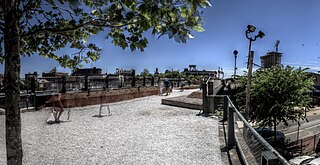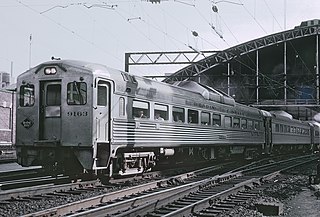
The Reading Company was a Philadelphia-headquartered railroad that provided passenger and freight transport in eastern Pennsylvania and neighboring states from 1924 until its acquisition by Conrail in 1976.

The SEPTA Regional Rail system is a commuter rail network owned by SEPTA and serving the Philadelphia metropolitan area. The system has 13 branches and more than 150 active stations in Philadelphia, Pennsylvania, its suburbs and satellite towns and cities. It is the sixth-busiest commuter railroad in the United States. In 2016, the Regional Rail system had an average of 132,000 daily riders and 118,800 daily riders as of 2019.

The Reading Viaduct, also called The Rail Park, is a disused elevated rail line in the Callowhill district of Philadelphia, Pennsylvania, United States that has been partly transformed into a rail trail.

The Airport Line is a route of the SEPTA Regional Rail commuter rail system in Philadelphia, Pennsylvania, which officially runs between Philadelphia International Airport through Center City to Temple University station. In practice, however, only a few trains originate or terminate at Temple University; most are through routed with lines to the north after leaving the Center City Commuter Connection. Half of weekday trains are through routed with the Warminster Line, with the other half of weekday trains through routed with the Fox Chase Line. All weekend and holiday trains are through routed with the Warminster Line and terminate either in Warminster or Glenside.

The SEPTA Main Line is the section of the SEPTA Regional Rail system from the Zoo Interlocking in West Philadelphia to Lansdale Station in Lansdale, Pennsylvania. The line is 26.25 miles (42.25 km) long, and serves all 13 SEPTA Regional Rail lines.
North Pennsylvania Railroad was a railroad company which served Philadelphia, Montgomery County, Bucks County and Northampton County in Pennsylvania. It was formed in 1852, and began operation in 1855. The Philadelphia and Reading Railway, predecessor to the Reading Company, leased the North Pennsylvania in 1879. Its tracks were transferred to Conrail and the Southeastern Pennsylvania Transportation Authority (SEPTA) in 1976.

The Schuylkill Branch was a rail line owned and operated by the former Pennsylvania Railroad (PRR) in Pennsylvania. The line ran from the Philadelphia to Harrisburg Main Line at 52nd Street in Philadelphia north via Norristown, Reading, and Pottsville to Delano Junction, about 2.5 mi (4.0 km) northeast of Delano. From Delano Junction, the PRR had trackage rights over the Lehigh Valley Railroad's Hazleton Branch and Tomhicken Branch to Tomhicken, where the PRR's Catawissa Branch began.

The Warminster Line is a route of the SEPTA Regional Rail commuter rail system. It serves stations between its namesake town, Warminster, and Center City Philadelphia. Half of the route is shared by other lines, including the Lansdale/Doylestown Line, West Trenton Line, Fox Chase Line, Chestnut Hill East Line, and Manayunk/Norristown Line. All trains continue as part of the Airport Line with the exception of some weekday trains that terminate at 30th Street Station, Thorndale, or Trenton Transit Center.

The Chestnut Hill East Line is a route of the SEPTA Regional Rail system. The route serves the northwestern section of Philadelphia with service to Germantown, Mount Airy, and Chestnut Hill. It is one of two lines that serve Chestnut Hill, the other one being the Chestnut Hill West Line. The line is fully grade-separated.

The Chestnut Hill West Line is a commuter rail line in the SEPTA Regional Rail network. It connects Northwest Philadelphia, including the eponymous neighborhood of Chestnut Hill, West Mount Airy, and Germantown, to Center City.

The Philadelphia, Germantown and Norristown Railroad (PG&N) was a railway company in the United States. It was incorporated in 1831 and opened its first line in 1832, making it one of the oldest railroads in North America. The Philadelphia and Reading Railroad, a forerunner of the Reading Company, leased the company's lines in 1870, ending its period of independent operation. Its lines are currently part of the SEPTA Regional Rail network in the Philadelphia region.

Shawmont is a former train station in Philadelphia, Pennsylvania. It is located on Nixon Street in the Roxborough section of Lower Northwest Philadelphia. Built by the Philadelphia, Germantown and Norristown Railroad, it later became part of the Reading Railroad and ultimately SEPTA Regional Rail's R6 Norristown Line. SEPTA made the station a whistle stop and closed its waiting room in 1991. SEPTA later closed the station in 1996. In 2018, $1 million was set aside for repairs and rehabilitation.
The Stony Creek Branch is a railway line in Montgomery County, Pennsylvania. It runs 9.9 miles (15.9 km) from Lansdale, Pennsylvania, to Norristown, Pennsylvania, connecting the Bethlehem and Doylestown Branches with the Norristown Branch. Although SEPTA owns the line, it is freight-only. CSX Transportation, Norfolk Southern Railway, and the Pennsylvania Northeastern Railroad have trackage rights on the branch.

The Norristown Branch is a railway line in Pennsylvania. It runs 14.6 miles (23.5 km) from a junction with the SEPTA Main Line in North Philadelphia to Norristown, Pennsylvania. It was originally built by the Philadelphia, Germantown and Norristown Railroad (PG&N) in 1834, and was a part of the Reading Company system from 1870 until 1976. Today it is owned by SEPTA and hosts the Manayunk/Norristown Line commuter rail service.

The Reading electric multiple units were a fleet of electric multiple units operated by the Reading Company on its Philadelphia commuter rail lines. The majority were constructed by Bethlehem Steel in 1931–1933; American Car and Foundry delivered additional cars in 1949. Some cars, rebuilt in 1964–1965 and christened "Blueliners", remained in service with Conrail and later the SEPTA until 1990. Several have been preserved.
The Main Line of the Reading Company was a railway line in the U.S. state of Pennsylvania. The 88-mile-long (142 km) main line ran from Philadelphia to Pottsville, Pennsylvania, following the Schuylkill River.
The Chestnut Hill East Branch is a railway line in Pennsylvania. It runs 5.5 miles (8.9 km) from a junction with the SEPTA Main Line in Nicetown–Tioga, a neighborhood in Philadelphia, to Chestnut Hill, Philadelphia. The oldest part of it was built in 1832 by the Philadelphia, Germantown and Norristown Railroad. It was part of the Reading Company system from 1870 until 1976. Today it is owned by SEPTA and hosts the Chestnut Hill East Line commuter rail service. The line runs roughly parallel to the Chestnut Hill West Branch, formerly of the Pennsylvania Railroad.
The Fox Chase Branch, formerly the Newtown Branch, is a railway line in the state of Pennsylvania. It runs 4.9 miles (7.9 km) from a junction with the SEPTA Main Line near Wayne Junction to Fox Chase. At its fullest extent, it continued another fifteen miles north to Newtown. The oldest part of it was built in 1876 by the Philadelphia, Newtown and New York Railroad. It was part of the Reading Company system from 1879 until 1976. Today it is owned by SEPTA and hosts the Fox Chase Line commuter rail service.
The New York Short Line was a railway line in Pennsylvania. It was operated by the Reading Company and built by the New York Short Line Railroad, a subsidiary. It was opened in 1906 to provide a more direct route between Philadelphia and New York City, bypassing the existing route via Jenkintown. The line was conveyed to Conrail in 1976 and is now part of the Trenton Subdivision of CSX.

The Pottsville Line was a commuter rail service in the Delaware Valley, connecting Pottsville, Reading, and Pottstown with Philadelphia. It was the last vestige of passenger service on the former Reading main line. The service lasted into the SEPTA era and was discontinued in 1981. SEPTA continues to operate Manayunk/Norristown Line commuter trains between Philadelphia and Norristown.
















